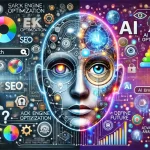The rapid evolution of artificial intelligence (AI) has transformed countless industries, and search engine optimization (SEO) is no exception. As AI systems like OpenAI’s ChatGPT, Google’s Bard, and other conversational models become more sophisticated, a new frontier has emerged: AI Engine Optimization (AIEO). This field goes beyond traditional SEO, focusing on optimizing content, data, and strategies to interact effectively with AI-driven search systems and chatbots.
This article delves deep into the concept of AI Engine Optimization, its significance, strategies, and the tools you need to excel in this dynamic digital landscape.
What Is AI Engine Optimization?
AI Engine Optimization is the process of tailoring your digital content and strategies to be effectively understood, processed, and utilized by AI-powered systems. Unlike traditional SEO, which targets search engine algorithms, AIEO focuses on ensuring that AI engines can provide accurate, context-aware, and high-quality responses or recommendations based on your content.
For example, when users interact with AI tools like ChatGPT or Alexa, they expect precise and relevant answers. AIEO ensures that your website or business content is among these AI tools’ top sources.
Why Is AI Engine Optimization Important?
- The Rise of Conversational AI
AI models are becoming primary information gateways for many users. Instead of typing search queries, people now ask AI systems questions directly. This shift requires businesses to rethink their digital strategies to ensure visibility in AI responses. - Enhanced User Experience
AI systems prioritize delivering concise and accurate information. If your content isn’t optimized for these systems, you risk being overlooked in favor of competitors who are better prepared. - Changing Algorithms
Search engines like Google are incorporating AI to enhance their algorithms. For instance, Google’s MUM (Multitask Unified Model) uses AI to understand complex queries. Optimizing for these systems is crucial to staying competitive. - Direct Business Impact
AI-driven tools influence purchasing decisions, product recommendations, and user trust. Businesses that fail to adapt to this trend risk losing out on significant opportunities.
Core Strategies for AI Engine Optimization
1. Focus on Contextual and Conversational Content
AI models thrive on understanding context. Unlike traditional SEO, where keywords dominate, AIEO emphasizes content that answers questions comprehensively and conversationally.
- Actionable Tip: Create FAQ-style content addressing specific user queries. Use natural language that mimics how users interact with AI tools.
2. Leverage Structured Data
AI systems rely heavily on structured data to retrieve accurate information. Schema markup and metadata play a vital role in helping AI understand your content.
- Actionable Tip: Use JSON-LD schemas for articles, FAQs, products, and reviews to ensure AI engines can interpret your site structure effectively.
3. Optimize for Voice Search
With the growth of virtual assistants like Siri, Alexa, and Google Assistant, optimizing for voice search is critical.
- Actionable Tip: Use long-tail keywords and conversational phrases in your content. Ensure your site is mobile-friendly and loads quickly, as many voice searches occur on smartphones.
4. Develop AI-Friendly Knowledge Bases
AI tools often pull information from trusted knowledge sources like Wikipedia or high-authority industry sites. Becoming a recognized source can boost your content’s visibility.
- Actionable Tip: Publish well-researched, authoritative content in your niche. Cite credible sources and provide detailed insights.
5. Adapt to Multimodal Search
Modern AI systems understand text, images, and videos simultaneously. Optimizing for multiple formats ensures your content remains accessible.
- Actionable Tip: Add descriptive alt text to images, optimize video transcripts, and use engaging visuals to enrich your content.
6. Embrace AI-Generated Insights
AI tools like Jasper or ChatGPT can help you analyze competitor strategies, suggest content ideas, or even generate drafts.
- Actionable Tip: Use AI tools for keyword research, content generation, and identifying trending topics in your industry.
7. Local Optimization for AI
Local search optimization is vital for businesses with a physical presence. AI systems like Google Assistant rely on accurate local data.
- Actionable Tip: Update your Google My Business profile, ensure consistent NAP (Name, Address, Phone) information across platforms, and gather user reviews.
8. User Intent Analysis
AI engines focus on delivering what the user intends, not just matching keywords. Understanding and targeting user intent is essential.
- Actionable Tip: Classify your content to address informational, transactional, or navigational intent. Tools like SEMrush or Ahrefs can help identify intent behind keywords.
Also Read


Challenges in AI Engine Optimization
- Complex Algorithms
AI algorithms are constantly evolving, making it challenging to keep up with the latest trends. - Unpredictable Outputs
Unlike traditional search engines, AI tools may not always provide predictable or replicable results based on your content. - Data Privacy Concerns
AI systems rely on vast amounts of data, raising concerns about user privacy and ethical considerations. - Integration Complexity
Integrating AIEO strategies into existing SEO practices can be time-consuming and resource-intensive.
Tools for AI Engine Optimization
- Google’s Search Console
Monitor your website’s performance and identify opportunities to optimize for AI-driven search. - ChatGPT/AI Tools
Analyze your content’s ability to answer conversational queries effectively. - Schema.org Validator
Test and implement structured data for better AI comprehension. - SEO Platforms (SEMrush, Ahrefs)
Identify keywords and topics that align with AI-driven queries. - Content Optimization Tools (SurferSEO, Clearscope)
Tailor your content for both traditional and AI-based engines.
The Future of AI Engine Optimization
As AI systems continue to grow in sophistication, the line between traditional SEO and AIEO will blur. Businesses must adopt a proactive approach to stay ahead, focusing on creating value-driven, context-aware, and multimodal content. Emerging trends such as AI-assisted personalization, real-time data processing, and augmented reality integrations will further expand the scope of AIEO.
Investing in AIEO strategies today will position businesses as leaders in the next phase of digital transformation.
Conclusion
AI Engine Optimization is not just the future of SEO—it’s the present. As users increasingly rely on AI-driven tools to find information, businesses must adapt to meet these changing demands. By focusing on conversational content, structured data, voice search, and user intent, you can ensure your digital presence remains strong in this AI-dominated era.
The shift from traditional SEO to AIEO represents a paradigm shift in digital marketing. Embracing it will enhance visibility and build stronger connections with an audience that now interacts with technology in more human-like ways than ever before.

